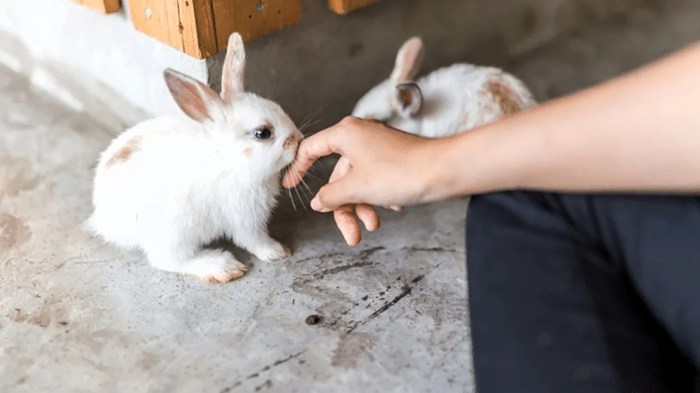Rabbits, those adorable and enigmatic creatures, have a unique way of expressing their emotions through licking. Whether it’s a gentle caress or a vigorous grooming session, understanding why your rabbit licks you can provide valuable insights into their behavior and strengthen your bond.
In this comprehensive guide, we will explore the various reasons why rabbits lick people, decipher the different types of licks and their meanings, and provide guidance on how to interpret and respond to your rabbit’s affectionate gestures. We will also discuss potential causes of excessive licking and offer solutions to prevent it.
Rabbit Licking Behavior
Rabbits are highly social animals that communicate through various behaviors, including licking. They use their tongues to express a range of emotions and intentions, each with its unique meaning.
Types of Rabbit Licks
Gentle Licks
Gentle licks are a sign of affection and grooming. Rabbits often lick their bonded companions, their young, or even their human caregivers to show care and strengthen their bond.
Hard Licks
Hard licks, also known as “marking licks,” are a way for rabbits to mark their territory. They secrete a scent from their saliva that helps them establish their presence and deter potential rivals.
Nipping Licks
Nipping licks are a form of communication that can indicate several things. They may be a playful gesture, a warning to back off, or a sign of annoyance or discomfort.
Interpreting Rabbit Licks
To accurately interpret rabbit licks, it is essential to consider the context, including the time of day, the rabbit’s mood, and other body language cues.
Time of Day
The time of day can influence the meaning of rabbit licks. For instance, rabbits tend to lick more frequently during grooming sessions, which typically occur in the early morning or evening.
Rabbit’s Mood
The rabbit’s mood also plays a role in interpreting licks. A rabbit that is relaxed and content may lick as a sign of affection or contentment. Conversely, a rabbit that is anxious or stressed may lick excessively as a way to self-soothe.
Other Body Language Cues
Other body language cues can provide further insight into the meaning of rabbit licks. For example, a rabbit that licks while making eye contact may be seeking attention or affection. A rabbit that licks while arching its back or flattening its ears may be feeling threatened or defensive.
Responding to Rabbit Licks
When your rabbit licks you, it’s important to understand their intentions and respond appropriately. The following are some common responses to rabbit licks:
Petting the Rabbit
If you enjoy your rabbit’s licks and want to encourage them, you can gently pet them. This will show them that you appreciate their affection and strengthen your bond.
Ignoring the Rabbit
If your rabbit’s licks are excessive or bothersome, you can try ignoring them. Rabbits are intelligent animals and will eventually learn that their licks are not getting the desired response.
Redirecting the Rabbit’s Attention
Another option is to redirect your rabbit’s attention to something else, such as a toy or treat. This will help them focus on something more appropriate and reduce their licking behavior.
Preventing Excessive Licking

Excessive licking in rabbits can indicate underlying issues that require attention. To prevent it, it’s crucial to identify and address potential causes.
Lack of Attention
Rabbits are social animals and require regular interaction. When they feel neglected, they may resort to excessive licking as a way to express their need for attention. Providing ample time for petting, grooming, and play can help fulfill their social needs and reduce excessive licking.
Boredom
Bored rabbits may engage in excessive licking to stimulate themselves. Offering a variety of toys, chews, and interactive activities can provide mental and physical enrichment, reducing the likelihood of boredom-related licking.
Health Issues
Certain health conditions, such as skin allergies or parasites, can cause irritation and discomfort, leading to excessive licking. If you suspect a health issue, consult a veterinarian promptly for proper diagnosis and treatment.
Closing Summary
Understanding your rabbit’s licking behavior is a crucial aspect of rabbit ownership. By recognizing the different types of licks and their underlying meanings, you can effectively communicate with your furry companion and foster a harmonious relationship. Remember, each rabbit is unique, and their licking habits may vary slightly.
Observing your rabbit’s behavior and providing a loving and supportive environment will help you decipher their affectionate gestures and strengthen the bond between you.
Helpful Answers
Why do rabbits lick their owners?
Rabbits lick their owners for various reasons, including affection, grooming, curiosity, and communication.
What do the different types of licks mean?
Rabbits have different ways of licking, including gentle licks, hard licks, and nipping licks. Gentle licks often indicate affection, while hard licks can be a sign of grooming or dominance. Nipping licks may indicate annoyance or playfulness.
How should I respond to my rabbit’s licks?
Appropriate responses to rabbit licks include petting the rabbit, ignoring the rabbit if the licking is excessive, or redirecting the rabbit’s attention to a toy or treat.
What are some potential causes of excessive licking?
Excessive licking may be caused by lack of attention, boredom, or health issues. Providing your rabbit with plenty of attention, toys, and a healthy diet can help prevent excessive licking.